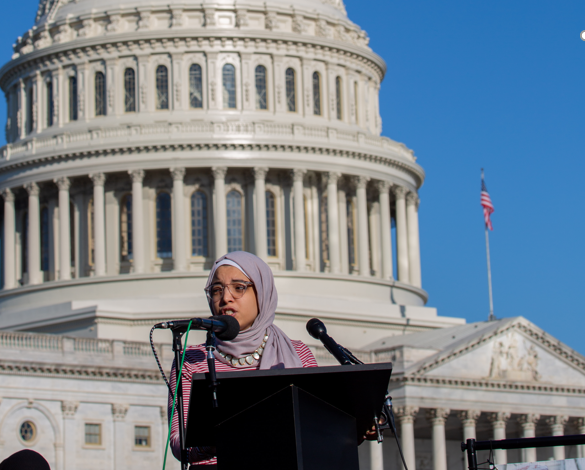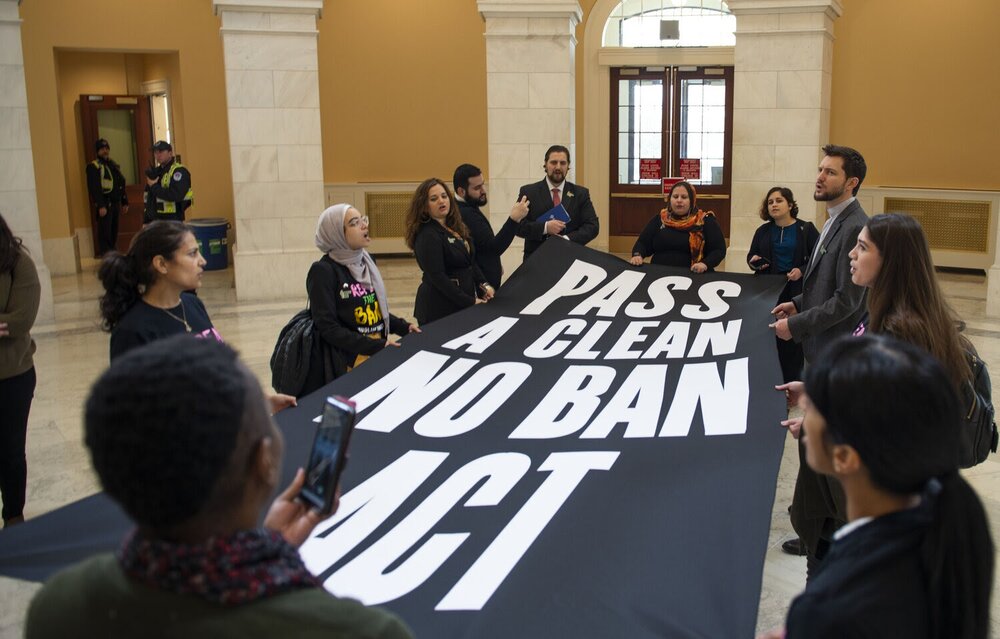No Muslim Ban Advocacy

To take a strong stance against Islamophobia, xenophobia, and injustice, since 2019, the Libyan American Alliance has partnered with the national NoMuslimBanEver coalition to speak against the Muslim Ban at press conferences, attend hearings, organize rallies, and mobilize Libyan Americans to advocate in support of the NO BAN Act.
In 2017, when former President Donald Trump implemented Executive Order 13780 and its supporting proclamations, more commonly known as the “Muslim Ban” or “Travel Ban”, thousands of people were barred from emigrating or traveling to the United States based solely on their nationality, resulting in thousands of family separations. Countries impacted by the ban included Myanmar, Eritrea, Iran, Kyrgyzstan, Libya, Nigeria, North Korea, Somalia, Sudan, Syria, Tanzania, Venezuela, and Yemen. In order to take a strong stance against Islamophobia, xenophobia, and injustice, since 2019, the Libyan American Alliance has partnered with the national NoMuslimBanEver coalition to speak against the Muslim Ban at press conferences, attend hearings, organize rallies, and mobilize Libyan Americans to advocate in support of the NO BAN Act.
The National Origin-Based Antidiscrimination for Nonimmigrants (NO BAN) Act is legislation introduced to prevent future Muslim and travel bans by strengthening the Immigration and Nationality Act to forbid discrimination on the basis of religion, and restoring the separation of powers by ensuring any future travel bans are narrowly constructed and follow appropriate consultation and oversight by Congress. The NO BAN Act was first introduced in the House of Representatives by Representative Judy Chu (H.R. 2214) and in the Senate by Senator Chris Coons (S. 1123) in April 2019.

Through LAA’s partnership with the NoMuslimBanEver campaign, our organization had the opportunity to take on a number of ventures to fight against the travel ban on Libyan visitors. Throughout the campaign, LAA encouraged Libyan Americans across the country to get in touch with their representatives about the NO BAN Act and shared campaign media about the Muslim Ban. In September 2019, LAA began attending congressional hearings on the Muslim Ban and spoke on behalf of Libyan Americans at the press conference prior to the event on Capital Hill. In January 2020, LAA participated in the Muslim Ban rapid response efforts, including helping prepare Libyan Americans to attend the court hearing on the ban in Richmond, Virginia. In early March 2020, LAA mobilized our advocacy plan for the NO BAN Act through participating in a banner drop organized by the NoMuslimBanEver campaign and lobbied congressional offices for their support on the bill.
In December 2020, LAA signed onto a coalition letter drafted by the Value Our Families Campaign and the No Muslim Ban Ever Campaign that urged then-President-elect Biden to rescind the Muslim and refugee bans after entering office. On January 20, 2021, President Joe Biden revoked the Muslim Ban and its related proclamations through Presidental Proclamation 10141, and, since then, immigration advocates have called on the Biden administration to support policy that would prevent any future administration from imposing similar bans. In February 2021, Representative Chu reintroduced the NO BAN Act (H.R. 1333) in the House, collecting 159 co-sponsors for the bill. In March, LAA signed onto a coalition letter addressed to Speaker Nancy Pelosi and Majority Leader Steny Hoyer, requesting Congress bring the NO BAN Act to the floor for a vote. The NO BAN Act passed the House 218-208 in April 2021. In May, Senator Coons reintroduced the NO BAN Act (S. 1891) in the Senate, and it currently sits in committee, waiting to be heard.
SUPPORTED BY

